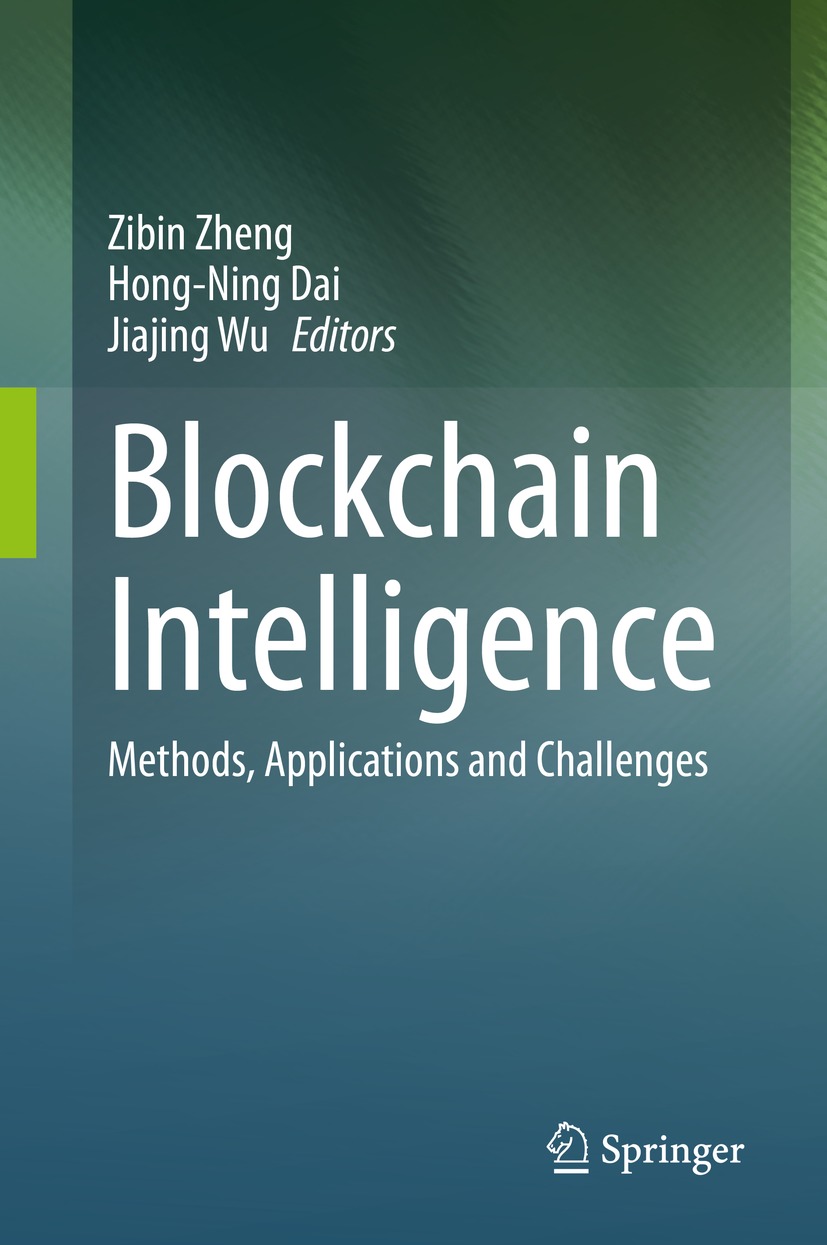Editors
Zibin Zheng
School of Data and Computer Science, Sun Yat-sen University, Guangzhou, Guangdong, China
Hong-Ning Dai
Faculty of Information Technology, Macau University of Science and Technology, Macao, China
Jiajing Wu
School of Data and Computer Science, Sun Yat-sen University, Guangzhou, Guangdong, China
ISBN 978-981-16-0126-2 e-ISBN 978-981-16-0127-9
https://doi.org/10.1007/978-981-16-0127-9
The Editor(s) (if applicable) and The Author(s), under exclusive license to Springer Nature Singapore Pte Ltd. 2021
This work is subject to copyright. All rights are solely and exclusively licensed by the Publisher, whether the whole or part of the material is concerned, specifically the rights of translation, reprinting, reuse of illustrations, recitation, broadcasting, reproduction on microfilms or in any other physical way, and transmission or information storage and retrieval, electronic adaptation, computer software, or by similar or dissimilar methodology now known or hereafter developed.
The use of general descriptive names, registered names, trademarks, service marks, etc. in this publication does not imply, even in the absence of a specific statement, that such names are exempt from the relevant protective laws and regulations and therefore free for general use.
The publisher, the authors and the editors are safe to assume that the advice and information in this book are believed to be true and accurate at the date of publication. Neither the publisher nor the authors or the editors give a warranty, expressed or implied, with respect to the material contained herein or for any errors or omissions that may have been made. The publisher remains neutral with regard to jurisdictional claims in published maps and institutional affiliations.
This Springer imprint is published by the registered company Springer Nature Singapore Pte Ltd.
The registered company address is: 152 Beach Road, #21-01/04 Gateway East, Singapore 189721, Singapore
Preface
Blockchain technologies have received extensive attention recently due to its provision of a secure and decentralized resource-sharing manner. The blockchain has also driven a diversity of applications, such as digital currencies, sharing economy, e-payment, digital government, and data provenance. Moreover, smart contracts based on blockchains can automate business activities so as to reduce service costs and improve the efficiency of business process.
Despite the merits of decentralization, immutability, non-repudiation, and traceability of the blockchain, the development of blockchain technology has undergone a number of challenges such as the difficulty of data analytics on encrypted blockchain data, poor scalability, software vulnerabilities of the blockchain, and scarcity of appropriate incentive mechanisms. The integration of Artificial Intelligence (AI) with blockchain has the potentials to overcome the limitations of the blockchain. In particular, machine learning-based approaches may help to analyze the blockchain data and to identify the misbehaviors in blockchain. In addition, deep reinforcement learning methods can be used to improve the reliability of blockchain systems.
The goal of this book concentrates on using AI to improve blockchain ecosystem. We name the intelligence bestowed by AI to blockchain as blockchain intelligence. The blockchain intelligence is essentially the integration of AI, big data analytics, and blockchain technologies. Gathering latest advances brought by AI in data analytics of blockchain data, this book also fosters the big data research on blockchain systems.
This book describes data extraction, exploration, and analytics on representative blockchain systems such as Bitcoin and Ethereum. It also includes data analytics on smart contracts, misbehavior detection on blockchain data, and market analysis of blockchain-based cryptocurrencies. Moreover, this book also outlines future directions in blockchain intelligence. This book provides both researchers and practitioners with valuable insights into big data analytics of blockchain data, AI-enabled blockchain systems, and applications driven by blockchain intelligence.
During the preparation for this book, we have also received supports from students including Peilin Zheng, Dan Lin, Qi Yuan, Yuan Huang, Queping Kong, Weili Chen, Jiahui Cui, Xiongfeng Guo, Qing Han, and Yuejin Xu. Many thanks for these helping hands to spare their time in preparing and revising the chapters of this book.
Acknowledgments
The research is supported by the National Key R & D Program of China (No. 2020YFB1006001), the National Natural Science Foundation of China (No. 62032025, No. U1811462, and No. 61973325), the Key-Area Research and Development Program of Guangdong Province (No. 2018B010109001 and No. 2019B020214006), and Macao Science and Technology Development Fund under Macao Funding Scheme for Key R & D Projects (0025/2019/AKP).
The work described in Sect. is published in WWW2018 Proceedings 2018 International World Wide Web Conference Committee, published under Creative Commons CC By 4.0 License.
The reproduced work described in Sect. is supported by the publisher called International Joint Conference of the Organization for Artificial Intelligence (IJCAI) and is copyrighted by the IJCAI.
The work described in Sect. is reproduced from Long-range dependence, multi-fractality and volume-return causality of Ether market, Chaos (2020), with the permission of AIP Publishing.
Zibin Zheng
Hong-Ning Dai
Jiajing Wu
Guangzhou, China Macau, China Guangzhou, China
Contents
Zibin Zheng , Hong-Ning Dai and Jiajing Wu
Peilin Zheng , Zibin Zheng , Jiajing Wu and Hong-Ning Dai
Dan Lin , Jiajing Wu , Qi Yuan and Zibin Zheng
Yuan Huang , Queping Kong , Nan Jia , Xiangping Chen and and Zibin Zheng
Weili Chen , Jiahui Cui , Xiongfeng Guo , Zhiguang Chen and and Yutong Lu
Qing Han , Jiajing Wu , Weili Chen , Yuejin Xu and Zibin Zheng
Hong-Ning Dai , Jiajing Wu and Zibin Zheng

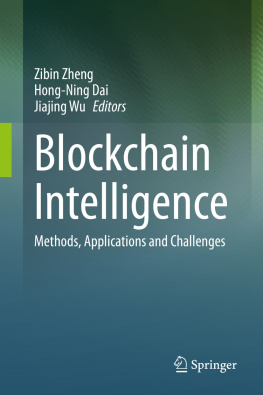
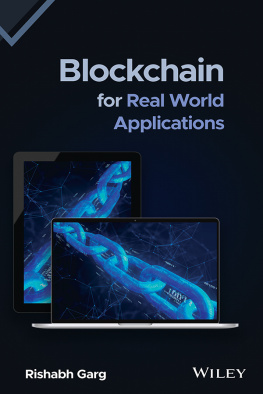
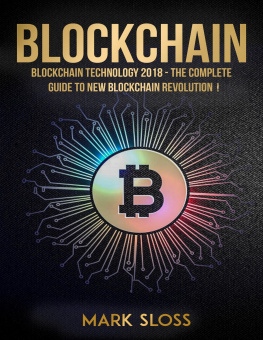

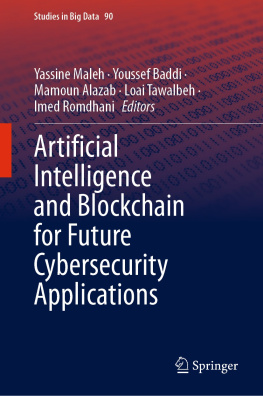
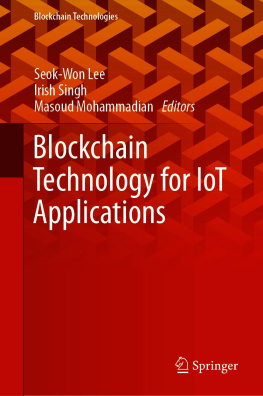
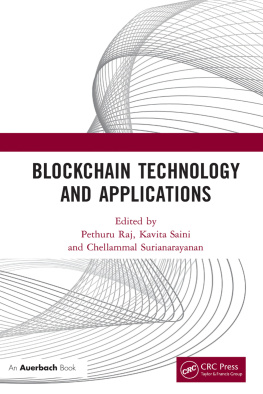
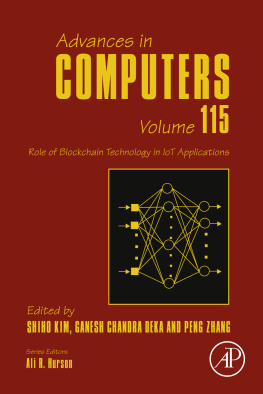
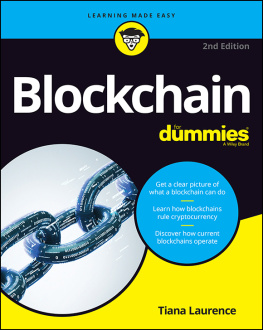
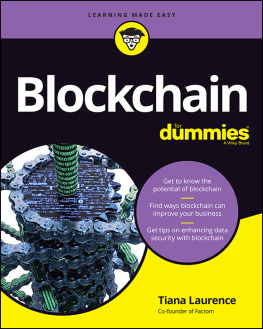

![Tiana Laurence [Tiana Laurence] - Blockchain For Dummies](/uploads/posts/book/119706/thumbs/tiana-laurence-tiana-laurence-blockchain-for.jpg)
